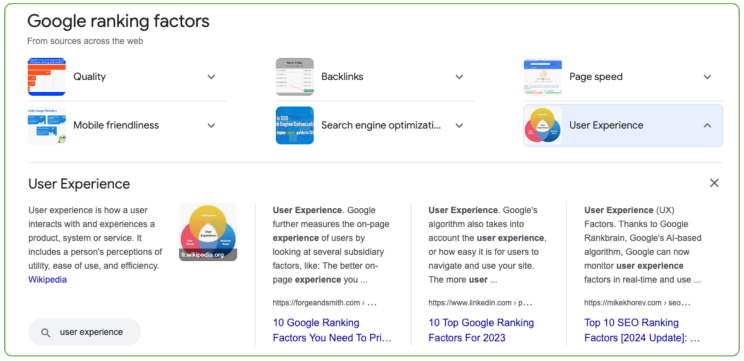How Website User Experience Affects Your Search Ranking
By Michelle Ackers on

A key trend in 2024 is the importance of User Experience (UX) and how it impacts your website ranking in search engines, as identified in our article "10 Trending Marketing Strategies for Tourism in 2024". Let's look at it in a bit more detail!
Fact: Travellers plan their transport, stays and adventures online. So, when it comes to attracting bookings, your website is your storefront window. But how do you ensure it grabs attention and keeps visitors engaged? The answer lies in User Experience (UX). Excellent UX doesn't just provide a smooth browsing experience, it's a key factor in Google rankings, propelling your tourism business to the top of search results.
Why UX Matters for Tourism Websites
Google's mission is to organise the world's information and make it universally accessible and useful. To achieve this, Google aims to deliver the best possible search results for its users.
Think of UX as the hospitality of your website. Would you want guests to navigate a maze to find the information they need? A user-friendly website with intuitive design makes it easy for visitors to discover your offerings, plan their trips, and ultimately, book with you. This positive user experience translates into signals for Google, indicating a high-quality website deserving of a prominent ranking. Google's algorithms now prioritise websites that offer exceptional UX!

Tips and Strategies to Enhance UX for Better Rankings
1. Optimise for Mobile Devices
Tourists often search for information on the go, making mobile optimisation crucial. Ensure your website is fully responsive, meaning it adapts seamlessly to various screen sizes and devices. Test your site on multiple devices to ensure consistency in design and functionality.

2. Improve Page Load Speed
Page speed directly impacts user satisfaction as faster-loading pages provide a better user experience and are favoured by Google. Use tools like Google PageSpeed Insights to identify and fix issues slowing down your site. Common strategies to enhance speed include:
Compressing images: Use formats like WebP and compress images without compromising quality.
Minifying CSS, JavaScript, and HTML: Remove unnecessary code to streamline your website's performance.
Leveraging browser caching: Store static files in the user's browser for faster loading on return visits.
Using a Content Delivery Network (CDN): Distribute your content across multiple servers worldwide to reduce load times.
3. Enhance Navigation and Structure
A well-structured website with intuitive navigation helps users find what they're looking for quickly and easily. Consider the following:
Clear Menu Structure: Use simple, descriptive labels for menu items.
Breadcrumbs: Provide a trail of links back to the homepage, aiding navigation.
Internal Linking: Link related content within your site to guide users and distribute link equity.
4. Create High-Quality, Engaging Content
Content is king, and high-quality, engaging content with 'visual storytelling' keeps users on your site longer. Ensure your content is relevant, informative, and tailored to your target audience. Showcase the beauty and experiences your destination and experiences offer with high-quality photos and videos to enrich the user experience. Additionally, regularly update your content to keep it fresh and valuable.
To keep track of it's effectiveness, metrics such as time on site and pages per session indicate how engaging and useful your content is.

5. Ensure Accessibility and Inclusivity
An accessible website caters to users with disabilities, ensuring a broader reach and better user experience. Easy navigation and clear, relevant content improve user satisfaction and engagement. Implement accessibility features such as:
Alt Text for Images: Provide descriptive text for images to assist visually impaired users.
Keyboard Navigation: Ensure all interactive elements are accessible via keyboard.
Readable Fonts and Contrasts: Use legible fonts and adequate colour contrasts for better readability.
6. Secure Your Website
Security is a top priority for both users and search engines. Use HTTPS to encrypt data and protect user information. Regularly update your website's software and plugins to guard against vulnerabilities and malware.
Beyond the Checklist: Building User Empathy
While technical aspects matter, exceptional UX goes beyond a checklist. Think of your target audience – what information are they seeking? What questions do they have? By understanding their needs and frustrations, you can tailor your website to address them directly, fostering a sense of connection and trust.
Insights From Our Team
At Tomahawk, we specialise in helping tourism businesses enhance your website UX and boost your online visibility. Our Creative Lead, Pallavi Karambelkar holds a Google Certification in UX Design and believes:
"The most important thing to recognise here is the difference between visual design, UI (User Interface) Design, and UX (User Experience). A website might be visually extremely beautiful and meet all the standards of the brand - but it can still rank low on User Experience, if the User Interface is difficult to engage with. "Pretty" is simply not good enough if it is not functional. An effective website for a tourism business must include all ingredients in appropriate proportions - brand presence, inspiration, and good quality user interface design that will lead to a great user experience - which in turn will lead to conversions."

Are You Ready to Review Your Website UX?
Incorporating UX best practices into your tourism website is not only essential for satisfying visitors but also for improving your search engine rankings. By focusing on mobile-friendliness, page speed, navigation, content quality, accessibility, and security, you can create a user-centric website that attracts and retains visitors.
Remember, the key to a successful online presence is continuous improvement. Regularly monitor your website's performance, gather user feedback, and adapt to evolving best practices to ensure your site remains at the forefront of user experience and SEO.
Get in touch with our team if you would like a UX audit and to find out more!
ABOUT THE AUTHOR
Michelle Ackers | Brand Marketing Manager
